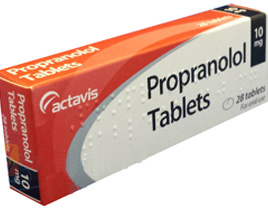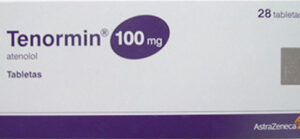Propranolol, known by its generic name, is a medication that belongs to the class of drugs called beta-blockers. It is commonly prescribed to treat various conditions, including hypertension (high blood pressure), angina (chest pain), and certain heart rhythm disorders. Propranolol works by blocking the effects of epinephrine on the heart and blood vessels, thus reducing heart rate and blood pressure.
This medication is available in oral tablet form and is typically taken 2 to 4 times a day, depending on the condition being treated. It is absorbed quickly into the bloodstream and reaches its peak concentration within 1 to 2 hours after ingestion. Propranolol is primarily metabolized in the liver and excreted in the urine.
Propranolol is also used off-label for the management of other conditions such as migraine headaches, essential tremor, and performance anxiety. This comprehensive drug manual provides important information regarding the use, contraindications, side effects, safety measures, drug interactions, and common questions associated with propranolol.
Do’s and Don’ts
Do not take propranolol if you have any of the following conditions or medical history:
– Asthma or any chronic obstructive pulmonary disease (COPD)
– Bradycardia (slow heart rate)
– Heart block or other heart rhythm disorders
– Diabetes (as propranolol can mask symptoms of low blood sugar)
– Raynaud’s disease (a condition that causes narrowing of blood vessels)
– Severe liver disease
Avoid abrupt discontinuation of propranolol as it can lead to a rebound effect, causing a sudden increase in heart rate and blood pressure. If you need to stop taking propranolol, consult your healthcare provider for proper tapering instructions.
Inform your doctor if you are pregnant or breastfeeding, as propranolol may affect the fetus or pass into breast milk. It is important to follow your doctor’s advice regarding the use of propranolol during pregnancy or while breastfeeding.
Managing Side Effects
Like any medication, propranolol may cause side effects. Some common side effects include:
– Fatigue or weakness
– Dizziness or lightheadedness
– Nausea or vomiting
– Cold hands or feet
– Sleep disturbances
– Erectile dysfunction (in men)
– Depression or mood changes
These side effects are typically mild and transient, but if they persist or worsen, notify your doctor. Additionally, propranolol may rarely cause serious side effects, such as:
– Difficulty breathing or wheezing
– Swelling of the face, lips, or tongue
– Unusual bleeding or bruising
– Sudden weight gain
– Slow or irregular heartbeat
– Severe dizziness or fainting
If you experience any of these severe side effects, seek immediate medical attention. It is essential to adhere to the prescribed dosage to minimize the risk of side effects.
Taking Propranolol Safely
To ensure the safe and effective use of propranolol, it is important to follow these guidelines:
– Take propranolol exactly as prescribed by your healthcare provider. Do not alter the dosage or frequency of administration without consulting your doctor.
– If you miss a dose, take it as soon as you remember, unless it is close to the time for your next scheduled dose. In such cases, skip the missed dose and resume your regular dosing schedule. Do not double the dose to make up for a missed one.
– If an overdose of propranolol is suspected, seek immediate medical attention. Symptoms of overdose may include slowed heart rate, wheezing, severe dizziness, and fainting.
– Avoid alcohol consumption while taking propranolol, as it can potentiate the sedative effects of the medication.
– It is important to monitor your blood pressure regularly while taking propranolol, as it may cause a decrease in blood pressure levels.
– Inform all healthcare professionals involved in your care that you are taking propranolol, as it may interact with certain medical procedures or anesthetics.
– Store propranolol at room temperature, away from moisture and heat.
Mixing with Other Drugs
It is crucial to inform your healthcare provider about all medications you are currently taking, including prescription, over-the-counter drugs, and herbal supplements. Propranolol may interact with various medications, such as:
– Other beta-blockers: Concurrent use of propranolol with other beta-blockers may increase the risk of side effects and decrease the therapeutic effects. Use with caution and under medical supervision.
– Calcium channel blockers: Combination therapy with propranolol and calcium channel blockers may lead to additive effects on heart rate and blood pressure. Dose adjustments may be necessary.
– Antiarrhythmics: Propranolol may potentiate the effects of antiarrhythmic drugs, increasing the risk of arrhythmias. Close monitoring is recommended.
– Antidepressants: Certain antidepressants, such as selective serotonin reuptake inhibitors (SSRIs), tricyclic antidepressants (TCAs), and monoamine oxidase inhibitors (MAOIs), may interact with propranolol, leading to increased side effects or changes in blood pressure. Regular monitoring is advised.
This is not an exhaustive list of drug interactions. Always consult your healthcare provider before starting, stopping, or changing any medications while taking propranolol.
Questions and Answers for Propranolol
-
Q: Can propranolol be used for anxiety?
A: Yes, propranolol is sometimes prescribed off-label for anxiety and performance anxiety. It can help reduce physical symptoms of anxiety, such as tremors and rapid heartbeat. -
Q: Can propranolol cause weight gain?
A: Weight gain is a rare side effect of propranolol. However, if you experience significant weight gain while taking propranolol, consult your healthcare provider. -
Q: Can propranolol be used for migraines?
A: Yes, propranolol is an FDA-approved medication for the preventive treatment of migraines. It is usually taken on a daily basis to reduce the frequency and severity of migraine attacks. -
Q: Can propranolol be taken during pregnancy?
A: Propranolol should be used during pregnancy only if the potential benefits outweigh the risks. Consult your doctor for personalized advice based on your specific situation. -
Q: Will propranolol cure my condition?
A: Propranolol helps manage certain conditions, but it does not cure them. It is important to continue taking propranolol as prescribed and follow your healthcare provider’s recommendations for long-term management.






Reviews
There are no reviews yet.